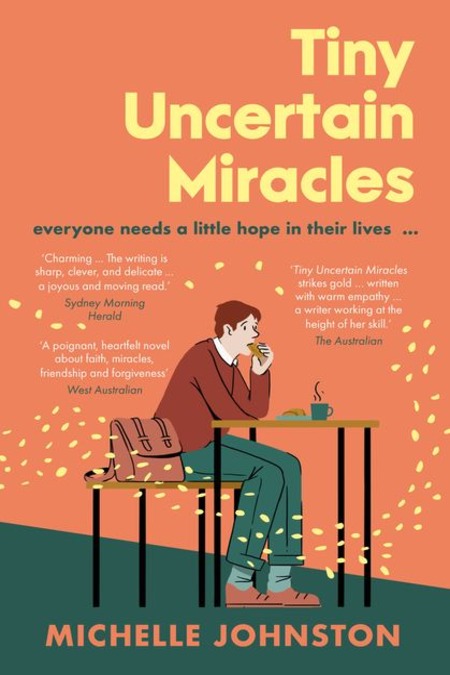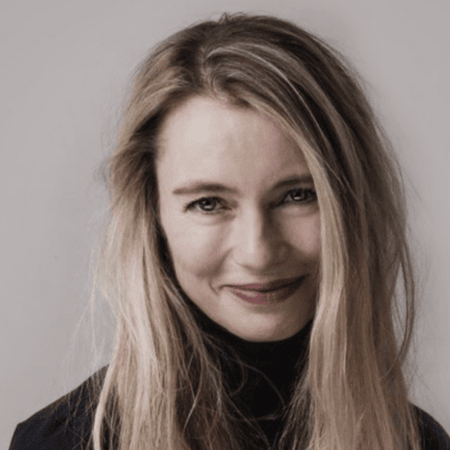(courtesy Harper Collins Publishers Australia)
It is hard, if not next to impossible when you are caught down in the depths of grief and loss, and the suffocating smallness of life that often comes with it, not to feel as if there is any hope left in life.
But as Tiny Uncertain Miracles by Michelle Johnson quietly and empathetically reminds us on every one of its beautifully thoughtful and insightful pages, hope and love are still in evidence even if they take some time to make their presence felt.
The person caught in an enviable vortex of hopelessness is Marick, a man mourning the loss of his family and his faith – a particularly thorny issue for a protagonist who, after the seismic shifts in life, decided to study for the priesthood – who finds himself forced to leave the church where he has been serving as a deacon’s assistant while he was studying at theological college and to take a role as a chaplain at a nearby hospital.
At first Marick finds the shift confronting; not simply because it is a big change in a life already riven by far too many of them, but because he is suddenly hard up against the gross deficiencies of his near non-existent faith and unable to ignore the fact that life can be viciously cruel to those who least deserve it as he watches people die and has to comfort families grappling with the sudden and painful loss of a loved one.
‘Will you come by tomorrow?’ Hugo asked.
Marick did not want clarification as to why. He would come by, of course. He departed, leaving Hugo focusing on the plates and the curiously coloured liquids and odd machinery, ready to set the whole circus in motion.
The hospital deaths had lost some of their bite.
His journey is told by Johnston in ways that are incisively moving, bleakly honest but also quietly encouraging as Marick, isolated in a studio apartment where he sleeps terribly, awoken at 4am like clockwork by vivid nightmares, begins to find small moments of meaningful connection with a diverse array of people in rabbit warren-like mysterious architecture of his new workplace.
His most significant new connection is with “disgraced” scientist Hugo who is working a job with robustly inflexible KPIs, the same kind that bedevil Marick who has to prove via stats to hospital management that he is comforting people, who is working away secretly in a makeshift lab in the bowels of the building on a quite extraordinary extracurricular project.
Rather remarkably the bacteria that Hugo is studying seems to be exhibiting signs that they are producing gold which seems fantastical to Marick, horrifying to hospital administrators and a miracle to believers like Dolly who runs the in-house shop which, to her lament, can no longer sell chocolate or anything unhealthy.
Whatever the truth of Hugo’s experiments, and Johnston rather wonderfully leaves it enticingly up in the air for much of Tiny Uncertain Miracles about there is gold in them thar bacteria or not, it provides a rare moment of hope for Hugo, a budding friendship for Marick who is desperately in need of a friend or two, and a point of focus for a great many people in the hospital weighed by the exhausting demands of day-to-day life.
(courtesy official author site)
What makes Tiny Uncertain Miracles so utterly captivating is how richly Johnston mines an unusual narrative premise for so much beautifully authentic insights on what it means to be human.
Marick’s friendship with Hugo sets in train a series of healing epiphanies, a new sense of purpose and some rather awkward and tempting complicating for our wonderfully real and hugely relatable protagonist while showing how desperately we all need connection of some kind or another and how our innate humanity is only at its best when that relational connective issue is present.
Watching Marick come alive in a very real and truthful way – there’s no hint of Hollywood blockbuster-type road to Damascus moments with nary a melodramatic moment to be had; even if there were, it would be woefully out of place in a way that feels so comfortingly and movingly grounded – reminds you just how much having a village around us is good for our souls.
Especially when we are lost and beleaguered and unable to find our way to healing and a place of new life which is diabolically difficult when all you can see is grief, pain and loss.
The beauty of Tiny Uncertain Miracles is that it is resolutely honest about terrible traumatically triggered social and emotional isolation, couple with any loss of faith in dogma, people or life (take your pick) and how it can hollow us out and leaving directionless and baffled by the next steps forward.
The suburbs passed in reverse, but to Marick they looked like a lost world.
Strangely, though, that night he slept through four o’clock.
But equally, in ways small and quiet, and magnificently big and loud – mostly the former to be fair but there are some moments that speak of the bigness and wonder of life – the novel celebrates the power of love, faith, friendship and family to remake and restore in ways tender and beautiful, and for Marick at least, ultimately healing.
Walking every step of the way with Marick in this affectingly meditative book is a joy – it’s dark at times, quite sad in others, and quietly funny in still more but always awash in a hopeful sense that life can be redeemed, that even the worst of things can find their point of restoration and betterment.
Testament to Johnston’s rich skill as a writer, Tiny Uncertain Miracles never shouts what it’s saying from the rooftops, reflecting the life that even when life is on the upswing, it really trumpets what it’s doing or where it’s going in ways that dramatic storytelling would embrace.
Rather many of the “big” moments in life, and this is true of Marick as much as anyone, occur in the quiet slivers between remarkable events, when people are on a break or they’re home alone or they spend time with someone who needs them.
Life is really big, flashy or showy and it can be hard and cruel and sad, but as Johnston’s sublimely wonderful novel, Tiny Uncertain Miracles, shows, it can be wholly wonderful and restorative too, and while it may or may not be miraculous, it is always filled with possibility, hope and love and all it takes is being the time and space to see that once again if you have lost all sight of what’s next.

